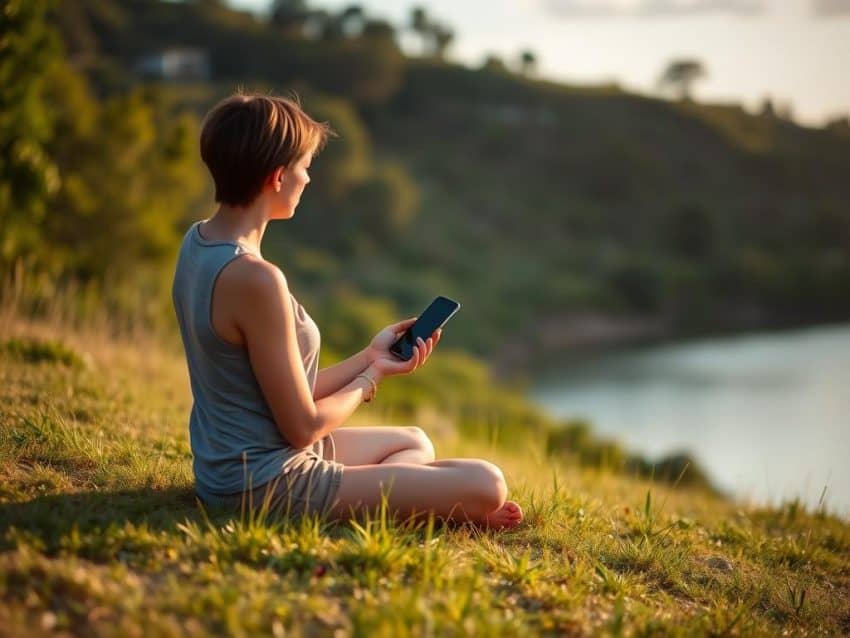Did you know the average person spends over two hours daily on social media? That’s more than five years of life spent scrolling and watching videos. As a Gen Zer, I realized how much social media affected my daily life and mental clarity. So, I decided to take a 30-day break from all social media, including Facebook, Snapchat, and YouTube.
During this month, I faced many emotional challenges. But I also learned a lot about the impact of social media on my life. I saw how it affected my focus and emotional health. Join me as I share my journey of digital detox and finding more awareness and connection.
Key Takeaways
- Realized how much time I spent on social media and its effects on my daily life.
- Noticed improved concentration and productivity without digital distractions.
- Engaged in deeper interactions with family and friends, enriching my relationships.
- Embraced moments of authenticity by stepping away from the pressure of curating an online persona.
- Found more time for meaningful activities like reading and journaling.
My Decision to Undergo a Social Media Detox
Using social media every day became too much for me. The constant alerts and need to check feeds made it hard to think clearly. Feeling like I had to be perfect online made me anxious and made me feel not good enough.
I realized how bad it was for me and decided to take a break from social media. I wanted to find happiness again.
The Struggles of Daily Social Media Use
Scrolling through social media made me stressed and unsure of myself. I kept comparing my life to others, which made me feel worse. This made it hard to focus and increased my anxiety.
I needed to stop the constant alerts for my mental health.
Reasons Behind My 30-Day Challenge
I decided on a 30-day challenge to change my life. I wanted to feel better about myself and pay more attention to things. Stepping away from social media was my plan to be stronger emotionally and make real-life connections.
I wanted to spend my time on things that make me happy. This detox was about reducing stress and finding joy in simple things.
The First Week: Cold Turkey Shock
Deciding to quit social media cold turkey was a big shock. I deleted Snapchat, Instagram, and TikTok from my phone. It made me realize how much these apps were part of my life.
At first, I felt really bad. I was used to spending four hours a day on social media. That’s over 124 hours a month. Without it, I got headaches, felt tired, and couldn’t focus.
By day three, I started to feel really scared. I wondered if I had made a mistake. I kept feeling like I needed to check my phone, even though it was gone.
Feeling the Gaps: FOMO and Anxiety
I felt left out a lot, worried about what my friends were doing. This made me anxious. It was hard to relax or focus on anything else.
As the week went on, I realized social media was everywhere in my life. By the end of the week, I felt better. But it made me think about changing my habits and enjoying the world more.

Week Two: Embracing Freedom and Focus
In the second week of my social media detox, I felt truly free from digital distractions. I started doing hobbies I had put off for too long. These hobbies changed my daily life and brought me a sense of fulfillment I hadn’t felt in a while.
Rediscovering Hobbies and Daily Life
I found joy in painting and taking care of succulents without social media. These hobbies brought out my creativity and helped me connect with the world around me. Spending time on these passions was rewarding, showing me the value of personal freedom and exploration.
By focusing on my hobbies, I reconnected with myself. This had a positive impact on my daily life.
Improved Concentration and Productivity
Without the urge to scroll, my concentration improved a lot. I could focus on tasks without distractions. This clarity made me more productive, helping me get more done in less time.
The freedom from distractions was amazing. It helped me stay present and focused.
Impact on Mental Clarity and Creativity
Breaking free from social media’s noise improved my mental clarity. Without constant information, my mind was calm. I could think clearly about my future.
I started carrying a notebook everywhere. Ideas flowed freely in my calm state. This boost in creativity was one of the best parts of my detox, showing the value of a slower life.
Conclusion
Looking back at my 30-day social media detox, I’ve learned a lot. I used to think my worth was tied to likes and followers. But stepping away showed me how wrong that was.
I noticed my anxiety levels went down a lot. This showed me how important real-life connections are, not just online ones.
One big surprise was how clear I became about my habits. Not being on social media as much made me see how much time I wasted. It also saved me money.
This experience taught me that taking a break from social media can be really good for you. It helps you focus on real-life relationships and improves your mental health.
I don’t think we should give up social media completely. But I do want to use it more wisely. This journey has shown me the importance of balancing our online and offline lives.
It’s about choosing real experiences that make us feel good and improve our mental health. I’m committed to using technology in a healthier way from now on.
